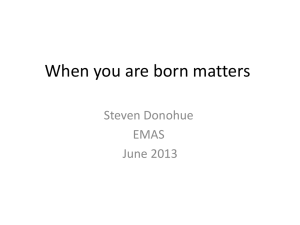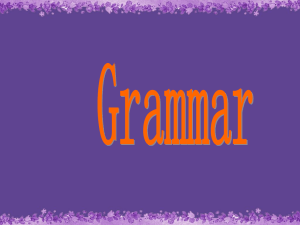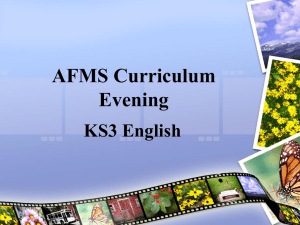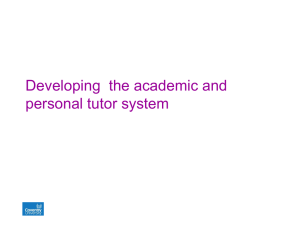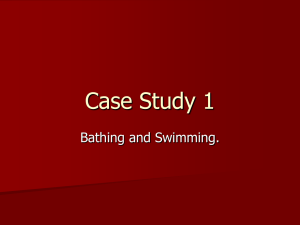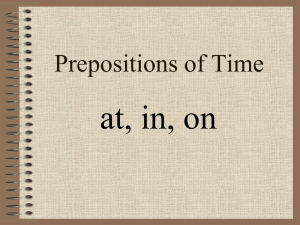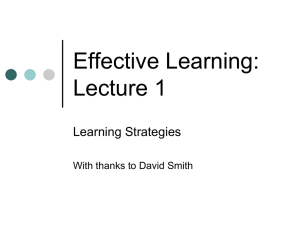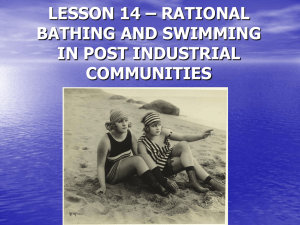Meet the Teacher Upper School - Maadi British International School
advertisement
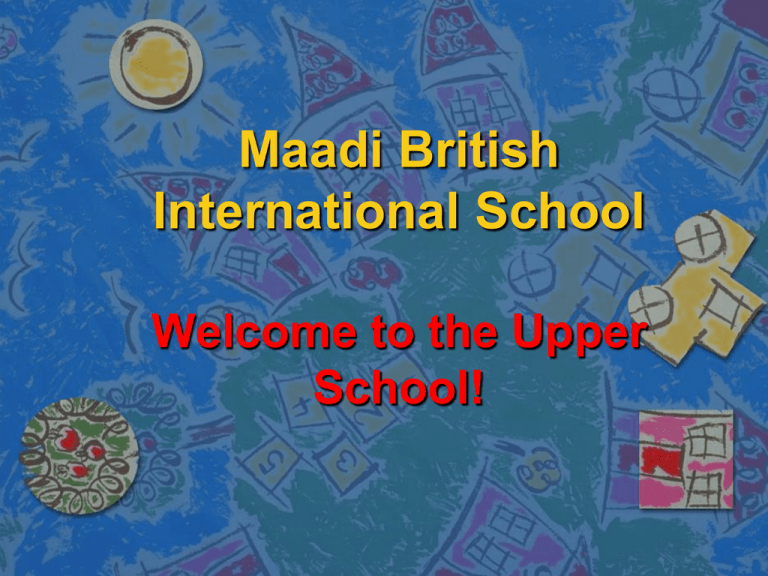
Maadi British International School Welcome to the Upper School! The Teaching Team and Subjects Taught Teachers: Ben Pocock - Upper School Co-ordinator and English Jamie Harding – 7JH Form Tutor, Mathematics Siân Hewitson – Science and Geography Ian Taylor – 6IT form Tutor and ICT Bee Cassimer – French and Spanish Jacqui Garib – 6JG Form Tutor, History and EAL Howard Garlick – Art/D.T., P.E. And learning Support The Teaching Team and Subjects Taught Teachers: Fiona Razek – P.E. Steven Williams – Music and Performing Arts Rehab El Deeb – Arabic Marwah Sultans - Arabic Graham McInroy - 8GM Form Tutor Teaching Assistants: Samha Loza Victoria Uzere Layla Abdullah English – main areas of learning National Literacy Strategy Whole class work Group and Individual work Plenary Speaking and Listening Reading Writing Drama Mathematics – main areas of learning We follow the English National Curriculum. Mental and oral starter. Whole class work. Plenary. Individual and group tasks. Key areas covered: Problem solving, number and algebra*, Geometry* and measures and Statistics. * These are covered in Year 7 and 8. Science – main areas of learning KS2/3 Curriculum. Completing KS2 and SATs preparation yr 6. Pearson Exploring Science – How Science Works yr 7&8. Key vocabulary. Key Skills and strands of assessment for levelling – Thinking Scientifically. – Understanding the applications and implications of science. – Communicating and collaborating in science. – Using investigative approaches. – Working critically with evidence. ICT – main areas of learning Importance of ICT Curriculum Aims KS2/KS3 Curriculum Finding Information 2. Developing Ideas 3. Communicating Information Core Skills 1. Reflecting 2. Analysing 3. Evaluation 1. Geography – main areas of learning Key Stage 2 National Curriculum and ISEB Curriculum. Key Concepts and Processes developed and used when looking at specific ‘Case Studies’ in each unit. Key vocabulary. National Curriculum Levels provide focused assessment in Year 7 and 8 during projects work, involving data collection, presentation, analysis and evaluation. History – main areas of learning Key Stage 2 National Curriculum and ISEB Curriculum. Equal focus on facts and skills. Focused assessment in Year 7 and 8, currently using National Curriculum Levels. Variety of practical and interactive strategies used as well as more traditional academic study. Modern Foreign Languages – main areas of learning Key Stage 3 Curriculum for MFL. Equal focus on listening, speaking, reading and writing. National Curriculum Levels currently used. Year 6 – French and Arabic. Year 7 and 8 – Option. Physical Education – main areas of learning 2 lessons per week – P.E. And Swimming. Areas covered: Gymnastics, Dance, Invasion Games, Net and Wall games, Striking and fielding games, Athletics. Interschool sporting competitions. Music – main areas of learning English National Curriculum. Equal focus on listening, performing and composing. Group, pair and individual work. Extra-curricular activities. Instrumental lessons. Art/D.T. – main areas of learning All units are based on the National Curriculum for KS2 and KS3. Artist/Genre research and comparisons. Sketching skills. Food technology- food hygiene, kitchen safety and healthy eating. Designing, making and evaluating of products. R.E./P.S.H.E. – main areas of learning R.E. and P.S.H.E. will be taught by the Form Tutors. A variety of R.E. and P.S.H.E. topics are studied across the Upper School. R.E.: Children develop a knowledge of major World Religions and Beliefs. P.S.H.E.: Children develop awareness of culture, community and global perspective. Our timetable… All students in the Upper School have a personal Timetable. Important Timetable information: Year 6IT Swimming: Wednesday Year 6IT P.E.: Thursday Year 6JG Swimming: Monday Year 6JG P.E.: Tuesday Year 7JH Swimming: Sunday Year 7JH P.E.: Thursday Year 8GM Swimming: Monday Year 8GM P.E.: Tuesday Timetables are flexible to meet the needs of the children Routines Reading – Study Centre and Library available daily before 8.15am and during breaks. Homework – Given once a week with one week to complete it. Tutors available to meet students from 8am every day. Snack, drinks and lunch available from the Upper School Canteen. Home Learning… Students keep a record of homework tasks and due dates in their planners. Homework tasks can also be viewed on Kidblog. MBIS Home Learning Policy will be reviewed in the second half of Term 1. How to help your child with home learning Establish a routine with your child: a set time and place for home learning to be done Check what tasks have been set and that your child understands what needs to be done Encourage independence: facilitate not dominate! Expectations In the Upper School the children will be encouraged to: Set an example to the rest of the students. Complete homework tasks and hand them in on time. Demonstrate a positive attitude towards school and hard work. Treat each other and the staff with respect. Reward systems Upper School Draw. House system – contributing to team success. Upper School Pupil of the week. Looking ahead… Book Week and International Week. Residential Trips. Interschool events. FOMBIS events. Upper School Production. Year 6 SATs and KS3 exams. The Home School Partnership Lines of communication: Open Door Policy. E-mail (bpocock@mbisegypt.com). Appointment. Parent Consultations in November, March, and June. F.O.M.B.I.S. Class Volunteer system jgarib@mbisegypt.com Halloween Thursday 31st October New school website After half term… Key information about the year group including: curriculum, timetables, how you can help your child at home use of Kidblog to support home learning Increased Any Questions...?

